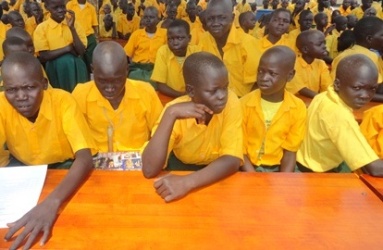S. Sudan: UNESCO earmarks $0.5m to fight high illiteracy rates
September 16, 2012 (JUBA) – The United Nations Educational, Scientific
and Cultural Organization (UNESCO) has earmarked US$500,000 to boost
efforts by South Sudan government to fight the high illiteracy rates
in the country, Salah Khaled, its head of office said.

bloody civil war, which massively destroyed its existing
infrastructures, including schools, tertiary and technical
institutions.
The country, according to its 2009 Household Survey report, has one of
the highest illiteracy rates in the world, with only 27 percent of
those aged 15 and above are said to be literate. Also, the vast
majority of South Sudanese, the National Bureau of Statistics figures
show, are unable to read and write.
“Literacy should involve all stakeholders in the country, regardless
of status in society,” Mr. Khaled said at a conference, organized to
mark literacy week in South Sudan.
UNESCO, Khaled told attendees at the two-day conference, will closely
work with the Education Ministry in the implementation of the
five-year (2012-2015) General Education Strategic Plan.
South Sudan, last week, officially launched a nationwide campaign
seeking to reduce by 50%, illiteracy rates among its adult population
by 2015. The campaign is part of its much-hyped “Education for All
(EFA) programme.
Joseph Ukel Abango, South Sudan’s Minister for General Education and
Instruction reiterated government’s commitment to reduce illiteracy in
the country, citing the recent passing of the General Education Bill
as a milestone in the education sector.
“Illiteracy can easily be overcome though political and social
campaigns involving all stakeholders in the country as stipulated in
South Sudan’s Transitional Constitution,” he said.
“We still have serious challenges to tackle,” he acknowledged, but
said the five-year General Education Strategic Plan, provides an
opportunity and platform for addressing the setbacks in the country’s
education systems.
South Sudan National Legislative Assembly (SSNLA) recently passed the
long-awaited General Education Bill, which among other provisions
considers the English language as the acceptable medium of instruction
in all schools in the country.
Also a concern, the General Education and Instruction Minister said,
was the low level of girls in primary schools. Women in South Sudan,
according to the 2009 Household survey report, are equally affected by
the high levels of illiteracy, with just 19 percent of them aged 15
and above said to be literate.
The Minister, however, urged all stakeholder and development partners
in the country to use to two-day literacy conference as a platform to
reflect on the human dimensions illiteracy can have on the population
in society.
KEY FACTS ON EDUCATION
- • South Sudan, with a literacy rate of 27% for those aged 15 and over,
- has one of the lowest rates of literacy in the world
- • Only 19% of South Sudanese women over age 15 found to be literate,
- with Jonglei State having the lowest literacy rate of 25% for those
- aged 15-24
- • Currently, over one million children are estimated to be out of
- school, and of those who do enroll, 27.3% drop out before completing a
- full cycle
- • Only 37.1% of eligible girls enroll in primary school and just 1.3%
- of them enroll in secondary level education
- • Only 32% of South Sudanese over the age of 15 have ever attended
- school, with the figure said to be just 26% for young people living in
- rural areas of South Sudan
- • South Sudan’s Education for All (EFA) Goal 4 is a 50% reduction in
- adult illiteracy by 2015, yet it remains one of the least funded.
(ST).
